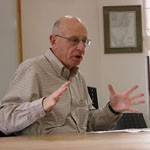
JERUSALEM — Politics here and there. Lots of it, but in different contexts.
Here in Israel it focuses on what is said to be a significant drop in new infections, and what should be open in response.
The reality is some doubt about the widely publicized figures, insofar as many of the Haredim are still avoiding the general rules about congregating, and not having themselves tested for the disease.
But the data publicized are showing a drop below 1,000 daily new cases, compared to mid-October spikes to over 11,000 daily.
The most prominent results are long meetings, where politicians argue about opening this or that, and in the case of school grades whether they be split into smaller sessions and meet for 6, 4, or 3 days or on alternate weeks. Some of those details will be left to the local authorities.
Hotels are still to be closed, along with restaurants, but those renting individual rooms to tourists will be open. Thanks to the political weight of those setting up “zimmerim,” along with pools, jacuzzis, and fancy breakfasts.
Synagogues will be open, but only for 10 people inside and 20 outside.
We’ll see how that happens among the Haredim.
Stores are to open along the street next week, unless daily infections drop below 500, but shopping malls continue to be closed. Except for their stores selling food and their large drug stores that sell just about everything along with medicines.
Hair cutters and cosmeticians are now in business. Along with lots of other stores who violate the rules and pay the fines.
Classes from first through fourth grade will be open, but who knows in what form and for how many pupils and days of learning.
Higher grades will be closed, except for special education for those with disabilities. Older pupils are more likely to pass on infections.
Meanwhile there has been learning by zoom, via computers and telephones, for all grades. And that is the medium widely spread in higher education.
Doubts about the opening of gyms and competitive sports.
Major contenders in these squabbles are the Ministers of Finance, Health, and Education, and the Prime Minister. Each of them have substantial staffs of professionals serving as advisers and implementers, and each of the Finance-Health-Education Ministers may have their eyes on the big prize after the demise of the Prime Minister. Or perhaps the presidency, which opens for competition within a year.
There is some conflict between the politicians at the heads and the staffs of those ministries. Finance usually runs the whole show, and its staff is a target of the brightest and most ambitious of university students. However, the Ministry has recently lost to resignations three of its top professionals, and the Minister has been maneuvering to demonstrate some degree of control.
But Bibi is really the top player, and has shown the capacity to ignore the desires and advice coming from below. His decisions seem to reflect his own desires to remain in charge and to keep a balance of other contenders.
In the US it’s all about the presidential election, along with those for the US House and Senate. Lower races and referenda also, but below the level of news coverage given them in Israel.
The Electoral College is something of a puzzle for many Israelis, but the media works to clarify that mass surveys of what the whole country prefers are only part of the story.
Big news about Biden vs Trump, along with a focus on key states with large electoral votes. And some attention to Kamala Harris’s Jewish husband.
Also, considerable attention to the large number of early voters, and the possibilities of delay in knowing the final results, with opportunities for contesting results and playing with the details of mailed-in ballots.
Trump’s buses brought lots of people to meet his plane in Nebraska, but the buses left them at the airport in freezing weather. Several were brought to hospitals afterwards.
Bets are in favor of Biden, but with substantial doubts about Trump’s supporters coming along toward the end, especially in key states.
And reports of many people arming themselves in preparation for an outburst of nastiness, perhaps from the right wing, or the left. Or maybe from both. And lots of stores being bordered up, in fear of violence.
Many of Trump’s supporters, especially perhaps, among Jews, recall a dismal presidency of Barak Obama.
He’s remembered as a supporter of the Palestinians. Perhaps. But his administration was prominent as a major source of aid for Israel’s defense.
Obama might be guilty of helping the Palestinian cause.
But who else, in a situation where the Palestinians have been their own worst enemies? They’ve been dreaming of returning to the borders of 1967, with a return of refugees, and are also responsible for promoting through their education the admiration of terrorists, whose families are supported by the Palestinians’ meagre resources.
What to do about them is a major issue for Israel.
But along with reprehensible slogans, their leaders also deal with us. And many thousands of them work in Israel on a daily basis.
Political help from the US White House–pre-Trump and maybe post-Trump–has not helped to solve their problems.
At least in the present, and as far as we can see into the future, there is no hope for them acquiring anything more than they have at present.
So why fear occasional statements and actions from the White House?
Especially if the principal speaker at the White House is overall more rational and less hate-promoting than what we’ve had for the most recent four years?
We’ll see how long the counting, the claims, appeals, and court cases take in order to declare a winner.
*
Ira Sharkansky, Ph.D is professor emeritus of political science at Hebrew University. He may be contacted via ira.sharkansky@sdjewishworld.com